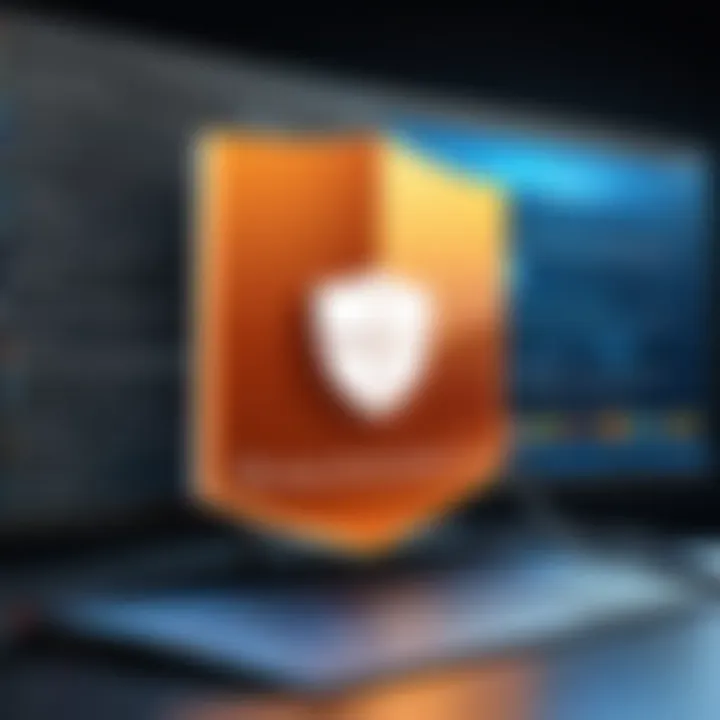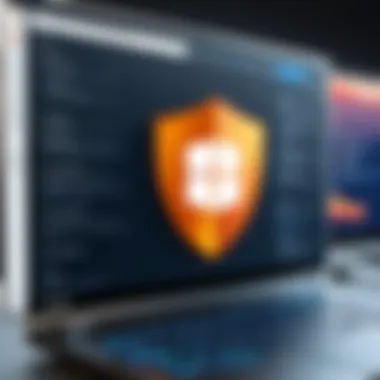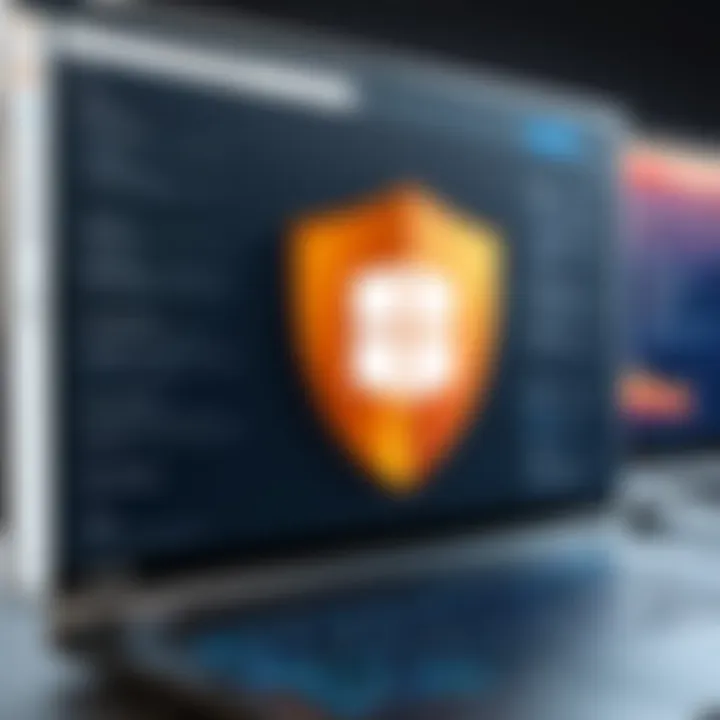Top Antivirus Choices for Windows 10 Users in 2023


Intro
In today’s world, navigating the vast ocean of the internet is akin to sailing in turbulent waters where unseen threats lurk beneath the surface. Windows 10, being a favorite operating system for many users, stands as both a tempting target for cybercriminals and a platform that demands robust protection. With myriad antivirus solutions crowding the market, discerning the right fit can seem like finding a needle in a haystack. This article provides a thorough analysis of leading antivirus programs specifically designed for Windows 10, guiding you through critical features and functionality, pricing considerations, and user experiences.
Selecting the ideal antivirus isn’t merely about picking the most popular option. It’s about understanding your unique needs, be it for personal use, for a small business, or in a more professional IT setting. That’s where this guide comes into play, aiming to empower you with knowledge and insights to make informed choices. Whether you're a tech enthusiast or someone just looking to safeguard their files, this article aspires to act as a compass in the complex terrain of digital security.
Software Overview
When diving into antivirus solutions, understanding the intricate components of each option is paramount. Each piece of software offers distinct features, licensing choices, and systems compatibility. Here, we delve deeper into these aspects, providing clarity that aids in making an educated decision.
Features and functionalities
Antivirus software today comes packed with a variety of features designed to tackle the multifaceted threats present in the digital landscape. For instance, many solutions offer real-time scanning, web protection, phishing detection, and a robust firewall. Some even provide additional perks such as VPN services, password managers, and file shredders. Evaluating these functionalities can be the deciding factor. Are you looking for a straightforward antivirus that does the job, or a comprehensive security suite that covers every corner?
Pricing and licensing options
Budget considerations play a crucial role in selecting an antivirus. The pricing structure can vary significantly, with options ranging from one-time purchases to subscription models. Some providers might offer enticing deals for the first year, only for the price to skyrocket upon renewal. Understanding the long-term financial commitment is essential. Check out the pricing models from well-known antivirus solutions like Norton, Kaspersky, and Bitdefender to gauge where your budget aligns.
Supported platforms and compatibility
Not all antivirus programs function the same across different devices. Windows 10 users may also have Android phones, Macs, or tablets needing protection. It’s essential to verify that your chosen software is compatible with your entire ecosystem. Often, solutions that offer cross-platform licenses can save you a pretty penny while ensuring comprehensive protection.
"With the right antivirus solution, users can navigate through the digital realm with a sense of security, knowing their data is shielded from potential threats."
User Experience
While core functions are indeed vital, the user experience offers a window into day-to-day usage. How intuitive is the software? Can you customize settings to fit your needs? Here, we examine the user interface, customizability, and overall performance.
Ease of use and interface design
A convoluted user interface can be a headache, especially for those who aren’t tech-savvy. Most antivirus software strives for a user-friendly design, yet the level of success varies. Easy navigation and clear instructions can make a world of difference in managing your security.
Customizability and user settings
The ability to tailor settings can significantly enhance the user’s experience. Some users may prefer default settings for simplicity, while others may want granular control over every scanning option. Finding a balance between accessibility and advanced features is critical and often defines user satisfaction levels.
Performance and speed
Performance is a double-edged sword in this context. While an antivirus should effectively protect against threats, it shouldn't drag your system down. Software that boasts minimal impact on system performance is usually favored by users who rely heavily on their machines for tasks requiring significant processing power.
Pros and Cons
Understanding the upsides and downsides of different antivirus solutions provides clarity in your decision-making process. Each software has unique strengths and potential limitations worth exploring.
Strengths and advantages of the software
Robust detection rates, frequent updates, user-friendly interfaces, and additional features like VPNs are common advantages seen across top antivirus contenders. Considering user testimonials and expert reviews can shed light on which options stand out.
Drawbacks and limitations
On the flip side, software dependencies, resource intensiveness, and relatively higher costs could pose challenges for some users. It's always prudent to consider what you might be compromising when selecting a security solution.
Comparison with similar products
By comparing antivirus software against competitors, one can identify better fits for particular needs. While some may excel in malware detection, others might shine in user interface or speed. A thorough comparison based on user needs tends to reveal the best options available.
Real-world Applications
Antivirus solutions are not only for individual users; they have applications across various industries. Recognizing how these products solve specific problems can illuminate their importance.
Industry-specific uses
For finance, retail, or healthcare sectors, the stakes for cybersecurity are high. These industries often require more specialized antivirus that meets regulatory standards. On the other end, casual users need something straightforward yet effective.
Case studies and success stories
Real-world examples can illustrate the effectiveness of antivirus solutions in mitigating risks. These stories often underscore how timely protection can thwart cyberattacks or data breaches, ultimately saving organizations from potentially crippling losses.
How the software solves specific problems
Understanding specific pain points that antivirus solutions address, such as ransomware protection or phishing scams, enhances their perceived value. Each software excels in different areas, so knowing what kind of threats are prevalent in your context might better inform your choice.
Updates and Support
Finally, the importance of software updates and customer support cannot be understated. These factors can directly influence how well an antivirus solution performs over time.
Frequency of software updates
Cyber threats are constantly evolving, and as such, antivirus companies need to put regular updates on their priorities list. Frequent updates help ensure that users are protected against the latest vulnerabilities and attack vectors.
Customer support options
Having access to responsive customer support can be a lifeline for users encountering issues. Whether it’s through chat, email, or phone support, knowing help is available adds a layer of reassurance.


Community forums and user resources
Active community forums where users share tips and experiences can also provide immense value. It’s a place where collective knowledge can help troubleshoot problems users face on a day-to-day basis.
Intro to Antivirus Software
In today's digital landscape, where the internet serves as both a bridge to information and a gateway for threats, understanding the role of antivirus software is paramount. Antivirus programs act as the front line of defense against a barrage of security threats, notably malware, ransomware, and phishing scams. As a user navigating the complexities of online interactions, it's crucial to grasp not only what these software solutions offer but also why they are essential in ensuring a safe computing environment.
The Importance of Antivirus Protection
Antivirus protection isn't just about blocking viruses; it's a multi-layered approach that encompasses various aspects of cybersecurity. Consider this: every day, millions of new malware variants are unleashed into the wild, targeting unsuspecting users. An effective antivirus solution helps safeguard against such threats. Without it, your personal data, financial information, and even the integrity of your whole system could be at serious risk.
Moreover, the stakes are particularly high for businesses, where a single breach can cost tremendous resources—both financial and reputational. By regularly updating definitions and employing advanced detection methods, antivirus software actively mitigates risks and shields critical assets.
In essence, the decision to employ an antivirus isn’t a mere preference; it is a necessity for anyone who engages in online activities.
Overview of Windows Security
Windows 10 comes equipped with various built-in security features, quite a few that bolster its resistance against cyber threats. The first line of defense is Windows Defender, a robust antivirus program that operates in real-time to catch threats before they can inflict damage. It leverages cloud-based protection to adapt and respond to evolving malware more effectively.
However, while Windows 10 security tools provide a strong foundation, they are not foolproof. Cyber threats evolve at a dizzying pace, thus integrating third-party antivirus solutions can provide additional layers of security that complement the built-in features. It's similar to having a well-fortified castle, yet allowing a proficient guard at the gates can exponentially increase safety.
In sum, while Windows 10 offers solid baseline protection, the nuances of today's cyber threats necessitate a deeper layer of security through reliable antivirus software.
Key Features of Antivirus Software
Antivirus software has become more than just a digital safeguard. With the ever-evolving landscape of cyber threats, understanding the key features of antivirus programs is crucial for every user. Whether you're a tech-savvy individual or running a business with sensitive data, knowing what to prioritize in an antivirus solution will help in making an informed decision about your online security.
The most significant benefit of utilizing a robust antivirus program lies in its ability to guard against various threats, from viruses to more complex malware. Beyond just detection, antivirus software needs to provide effective measures to prevent infections, safeguard personal information, and establish a secure browsing environment.
Real-Time Protection Capabilities
Real-time protection stands as a backbone feature of any reputable antivirus software. This capability ensures that any harmful software attempting to enter your system is caught instantaneously. Picture this: you're browsing the web and clicking through links that seem harmless. A malicious script tries to infiltrate your machine. Real-time protection acts like your virtual bouncer, keeping out any unwelcome guests before they make it past the door.
The importance of this feature cannot be overstated. According to many cybersecurity experts, the majority of effective antivirus programs offer this through various methodologies:
- Behavior-based detection: This approach monitors programs in real time, allowing the software to identify new and unknown threats based on suspicious actions rather than relying solely on a database of known malware.
- Cloud-based updates: In this modern age of cyber warfare, cloud technology allows for quicker updates and enhanced detection capabilities, ensuring the software can react to fresh threats swiftly and efficiently.
Malware Detection Techniques
Digging a little deeper, malware detection techniques come into play as fundamental tools that antivirus software employs. Various methods allow for different attack vectors to be identified. Here are a couple of common detection techniques:
- Signature-based detection: This traditional method scans files and compares them against a database of known malware signatures. While effective, it can be less efficient against new threats that have not yet been cataloged.
- Heuristic analysis: Introducing a far more cunning technique, heuristics evaluate file behaviors and attributes to detect anomalies that could indicate a malicious presence, even if that malware has never been seen before.
Using a combination of these techniques not only enhances the detection rate but also provides a multi-layer shield against various cyber dangers.
Firewall Protection Features
Another critical feature is firewall protection. A firewall acts as a barrier between your computer and potential threats from the internet. Depending on your needs, you can choose a software-based firewall or a more robust hardware solution.
Most antivirus programs come with built-in firewalls which can:
- Control incoming and outgoing traffic: By filtering data packets, the firewall ensures that potentially harmful data does not reach your system.
- Block unauthorized access: Firewalls establish rules and boundaries, keeping unwanted skulkers at bay from your personal network.
Having a firewall integrated within your antivirus solution not only streamlines the protection process but also reduces potential vulnerabilities from other sources.
User-Friendliness and Interface Design
User experience should never be an afterthought, especially for software designed to protect vital data. A user-friendly interface does not merely make navigation more enjoyable; it facilitates understanding. If the software appears overwhelming or complex, users might miss critical alerts or fail to utilize essential features.
Creating a balance between functionality and simplicity is key. Good antivirus solutions emphasize:
- Intuitive navigation: Easily accessible menus and settings allow users to adjust protections quickly.
- Clear notifications: Alerts about threats or needed actions should be presented transparently and understandably.
- Accessible support options: Easy access to help resources reduces frustration and fosters effective usage.
In the world of digital security, the less time one spends Googling support queries, the better!
"The best antivirus solution is one that not only protects but also equips users to protect themselves."
Leading Antivirus Software for Windows
When it comes to safeguarding your digital realm, the significance of selecting the right antivirus software cannot be overstated. The fast-paced evolution of malware and cyber threats mandates that Windows 10 users have robust protection on their machines. With various options available, diving into the leading antivirus software is essential. Each offering possesses distinct traits, advantages, and functions tailored to fit diverse user needs.
Norton Antivirus
Features Overview
Norton Antivirus has made a solid name for itself in the realm of cybersecurity. One of its standout features is the Norton Insight, which provides real-time analysis of potential threats based on the user's usage behavior. This tailored approach adapts to individual environments, making it a beneficial choice for those who require a personalized layer of protection. The proactive scanning technology in Norton allows users to stay ahead of threats, swiftly identifying them before they cause damage. However, while its depth of features is impressive, the user interface can feel overloaded for some, complicating straightforward navigation.
Performance Evaluation
When evaluating Norton Antivirus for performance, it shines in its ability to minimize system slowdowns. Its Smart Scan feature intelligently schedules scans during inactive hours, ensuring that the user’s experience remains seamless. While it provides thorough coverage, some users have reported instances of false positives, which can lead to frustration when benign software is flagged. Still, the overall performance is often rated highly across various independent tests, underscoring its reliability.
Pricing Details


From a financial standpoint, Norton Antivirus offers a tiered subscription model catering to various user needs. Its pricing, while sometimes considered on the higher end, reflects the extensive features and support it provides. Notably, users can benefit from multi-device plans that ensure all family members' devices are secured under one account, providing excellent value long-term despite the initial investment.
Bitdefender Antivirus
Core Features
Bitdefender Antivirus is renowned for its comprehensive suite of security features. One notable aspect is its Advanced Threat Defense, which utilizes behavioral detection to catch previously unknown malware before it can inflict any damage. This proactive approach resonates with users who prioritize cutting-edge technology for protection. The downside lies in its customization options, as some users may find the default settings too complex for their needs.
User Experience
User experience with Bitdefender is generally favorable. The interface is clean and intuitive, allowing even less savvy individuals to navigate effortlessly. The Bitdefender Autopilot feature streamlines the security process, automatically adjusting settings based on user behavior, which many find a major plus. Nevertheless, there have been mentions of occasional pop-ups that can disrupt focus, thus highlighting the balance between protection and user comfort.
Cost Analysis
In terms of cost, Bitdefender is typically viewed as a strong contender because of its competitive pricing. It caters to both casual users and small businesses alike, offering flexible plans that can accommodate varying budgets. Users will appreciate the value gained from its array of features at a reasonable price point, making it an attractive option compared to others on the market.
Kaspersky Antivirus
Key Functions
The key functions of Kaspersky Antivirus involve its leading-edge real-time scanning capabilities, which operate in the background without impeding system performance. This invisibility often becomes a defining feature for users. Moreover, Kaspersky’s privacy protection functions, such as VPN and Anti-Phishing, give an additional layer of safety. On the flip side, some users have questioned the transparency of its data policies, creating hesitance for those concerned about privacy issues.
Effectiveness Review
When it comes to effectiveness, Kaspersky consistently ranks highly in independent testing for its malware detection rates. With learning AI continually updating its threat database, users feel reassured about their security. Nevertheless, there have been concerns regarding its geographical limitations for corporate users, leading some to consider alternative solutions depending on operational zones.
Licensing Options
Kaspersky provides users with varied licensing options, making it suitable for households and businesses alike. While individual licenses cover single devices, their family and business plans offer substantial savings for bulk protection. A minor drawback, however, is the relatively restrictive install limits, which can be a concern for those with numerous devices.
McAfee Antivirus
Distinctive Features
McAfee Antivirus is often lauded for its distinctive feature set, particularly its WebAdvisor tool, which proactively warns users about dangerous sites and downloads. This self-defense mechanism allows it to shine brightly among competitors. Conversely, the abundance of features might overwhelm casual users who prefer a simpler solution.
Impact on System Performance
Integrating McAfee into a Windows 10 system can have a mixed impact on performance. While its Quick Clean option removes unwanted files effectively, some users have reported noticeable slowdowns during extensive scans. Thus, while its protective abilities are commendable, they may come at the minor cost of system speed.
Subscription Models
Financially, McAfee offers flexible subscription models catering to different needs. Their multi-device protection plan stands out, encompassing a range of devices under a single account. Though it offers a good bang for buck, occasional promotional tactics can create confusion about pricing, frustrating potential subscribers.
In a world where cyber threats are as common as the air we breathe, understanding the leading antivirus software available for Windows 10 is not just beneficial—it is crucial.
Comparative Analysis of Antivirus Products
When it comes to safeguarding your computer, especially in today's digital landscape, a comparative analysis of antivirus solutions becomes a crucial undertaking. Not all antivirus software are created equal, so discerning the differences in performance, protection capabilities, and usability among various options is vital. By conducting this analysis, users can make informed decisions that will ultimately protect their personal and professional data more effectively. The comparative analysis doesn’t just cover the obvious features, but digs deep into how well these products perform under real-world conditions, providing a holistic view of their strengths and weaknesses.
Performance Metrics and Tests
Performance metrics play a pivotal role in evaluating antivirus products. Users often want assurance that their chosen software won't slow down their system while ensuring optimal protection against threats. Common metrics to consider include:
- Malware detection rate: This indicates how effectively a program can identify and block malware threats.
- System performance impact: It’s essential to see how antivirus software affects system speed during scans or regular operations.
- False positives: This metric represents how many non-malicious files are wrongly flagged as threats.
It’s important to consider not just the numbers but also the context. For example, a high detection rate paired with a severe system slowdown might not be acceptable for a gaming system. Rigorous third-party tests conducted by independent organizations like AV-Comparatives or AV-Test provide a wealth of information that can help users ascertain which software aligns with their needs. Relying solely on the marketing claims made by antivirus companies might lead to underwhelming experiences in real use.
User Ratings and Feedback
In this day and age, user ratings can’t be brushed aside. They offer raw, unfiltered insight into how antivirus software performs over time and how it adapts to new types of malware. Here are some considerations when evaluating user feedback:
- Satisfaction levels: High satisfaction ratings usually reflect consistent updates and responsive customer service. Users often share their experiences about how well the software handled certain threats.
- User-friendly interfaces: The convenience of navigating through the software can make a big difference in user experience, especially for those who may not have advanced tech skills.
- Customer support: In case of issues, responsive and effective customer support can be a game-changer. Reviews can reflect this aspect effectively.
In addition, online platforms such as Reddit and specialized tech forums often have threads discussing various antivirus products, providing anecdotal experiences that could highlight pros and cons often missed in official reviews. A combination of numerical ratings and qualitative feedback can provide a comprehensive picture. Gathered over time, user reviews often reflect the real-world effectiveness of the software across different types of users and systems.
"A well-informed decision regarding antivirus software hinges not just on professional tests but heavily on community insights and user experiences."
By understanding these various elements, users can sift through marketing jargon and identify antivirus products that not only make bold claims but consistently deliver results.
Evaluating Costs vs. Benefits
When it comes to picking an antivirus solution, weighing the costs against the benefits is crucial. Antivirus software acts as a digital fortress against various threats, but the right choice can significantly affect the overall health of your system and bank account. Some solutions might come with price tags that make you cringe, but at what price are you buying peace of mind? On the flip side, free antivirus options could leave your virtual door ajar, welcoming malware into your system noise without much fuss. Here, we’ll discuss why evaluating these costs and benefits matters.
Free vs. Paid Antivirus Solutions
The ongoing debate between free and paid antivirus solutions is often akin to choosing between a cast-iron frying pan and a flimsy non-stick one.
- Free Antivirus Software:
- Paid Antivirus Software:
- Usually offers basic protection against common threats.
- Updates may not be as frequent or comprehensive.
- You might find ads or prompts for paid upgrades frustrating.
- Customer support is often limited or non-existent.
- Offers advanced features, like real-time scanning, firewalls, and ransomware protection.
- Regular updates mean better protection against newer threats.
- Access to customer support can save the day, especially when dealing with tricky malware.
- Additional features like VPN services may come bundled, providing an extra layer of security.


When weighing these options, think about what you're protecting. If it's just a laptop with the occasional web browsing, a free solution might cut the mustard. But if you handle sensitive information, investing in a paid solution could be worth every penny for the peace of mind it offers.
By understanding the strengths and weaknesses of free and paid antivirus solutions, users can make informed choices tailored to their digital lives.
Considerations for Businesses
For businesses, the stakes are often higher. Evaluating cost versus benefits transcends the individual; it reaches into the core of operational integrity.
- Data Protection:
- System Efficiency:
- Long-term Planning:
- Training and Support:
- Companies are increasingly targeted by cybercriminals. Investing in robust antivirus solutions means protecting sensitive data and ensuring compliance with regulations like GDPR.
- Poor antivirus performance can bog down system operations. Costs associated with slow systems or malware infections often outweigh the expense of a reliable antivirus program.
- A wise investment here means planning for scalability. Many businesses opt for enterprise solutions that accommodate growth and change.
- Training staff to recognize phishing and other threats is as vital as protective software. Budgeting for both antivirus and training creates a more secure environment.
For a business considering their options, it’s not just about the immediate financial outlay. It’s about creating a resilient operation that can withstand the ebb and flow of digital threats. Investing wisely now can save a great deal of headache down the road.
Common Misconceptions About Antivirus Software
Antivirus software is often shrouded in layers of myths and misconceptions that can lead users astray. As technology evolves, so do the methods and purposes of digital threats. Thus, understanding these misconceptions is not just a minor detail; it's a pivotal step toward effective digital security. This segment pries into the common myths surrounding antivirus software, highlighting why they should be debunked for both IT professionals and casual users alike.
One significant misconception is that antivirus software can provide foolproof protection. In reality, while antivirus solutions play a crucial role in guarding against known malware and certain types of attacks, they can't catch everything. New forms of malware emerge daily, and many are designed to evade traditional detection methods. Therefore, relying solely on antivirus software without adopting other security measures can leave your system vulnerable.
Another prevalent myth is that free antivirus solutions offer the same level of protection as their premium counterparts. While there are some commendable free options, they often lack essential features such as real-time scanning, automatic updates, and customer support, which could lead to lapses in security.
Additionally, many users believe that installing multiple antivirus programs will provide better protection. However, this can actually invite conflicts that may harm system performance or even reduce overall security.
"Understanding and overcoming these misconceptions is vital for maintaining robust cybersecurity practices."
Lastly, it's also commonly thought that once antivirus software is installed, users can set it and forget it. Regular updates and proactive scanning are essential to ensure optimal protection against emerging threats. Cybersecurity should always be a continuous effort rather than a one-time installation.
Debunking Myths
- Myth 1: Antivirus Software Guarantees Total Protection
- Myth 2: Free Antivirus Solutions Equal Paid Options
- Myth 3: Using Multiple Antivirus Programs Is Safer
- Myth 4: Antivirus Software Does Not Require Any Maintenance
- Reality: There's no such thing as absolute security. Users should complement antivirus software with other defensive measures like firewalls, data encryption, and safe browsing practices.
- Reality: Free versions may lack critical features like comprehensive customer support, a full range of detection tools, and regular updates, making them less reliable overall.
- Reality: Running more than one antivirus can lead to software conflicts, system slowdowns, and reduced effectiveness when dealing with threats.
- Reality: Regular updates and scans are necessary to stay ahead of new threats. Periodic reviews of settings and security protocols ensure ongoing protection.
Future Trends in Antivirus Technology
In today’s digital landscape, the efficiency and adaptability of antivirus software are paramount. The ongoing evolution of cyber threats necessitates that antivirus solutions not only keep pace with current attacks but anticipate future vulnerabilities as well. Understanding future trends in antivirus technology is crucial for IT professionals, software developers, and businesses seeking robust digital protection.
The importance of embracing these trends lies in the need for adaptable security. As cybercriminals become increasingly sophisticated, traditional antivirus methods alone may not suffice. Organizations and individuals alike must consider next-generation approaches that leverage advancements in technology. This section will focus on two pivotal trends shaping the future: Artificial Intelligence (AI) and cloud-based protection.
Artificial Intelligence in Antivirus Solutions
Artificial intelligence is gradually becoming the backbone of modern antivirus software. Its role revolves around enhancing malware detection and response mechanisms, allowing for a more proactive approach to cyber defense.
AI has the capacity to analyze vast amounts of data quickly, detecting patterns and anomalies that human analysts might overlook. Different algorithms are employed to regularly sift through user data and behavioral patterns, identifying potential threats before they become actual breaches. This provides a significant advantage, particularly when the average time to identify a data breach is around 207 days.
Key benefits of integrating AI into antivirus solutions include:
- Improved Detection Rates: AI can continually learn and adapt, allowing antivirus solutions to evolve with emerging threats.
- Reduced False Positives: By accurately distinguishing between legitimate software behavior and potential threats, AI minimizes unnecessary disruptions to users.
- Automatic Response Capabilities: An AI-enabled antivirus can automatically isolate infected systems, limiting damage while fake detection is investigated.
However, reliance on AI is not without its considerations. One potential drawback is the possibility of adversarial attacks, where hackers might exploit AI's learning algorithms. Thus, antivirus providers must find the balance between AI-driven technology and traditional security measures.
The Role of Cloud-Based Protection
Cloud-based protection is the second significant trend poised to redefine antivirus technology. By leveraging the power of the cloud, antivirus solutions can offer enhanced features that are often not feasible with local installations.
Cloud solutions store and process vast amounts of data in real-time, allowing for:
- Centralized Threat Intelligence: Continuous updates from all users help build a comprehensive database of emerging threats. This shared intelligence ensures that users are shielded against the latest malware as soon as it’s identified.
- Lightweight Client Applications: Since the heavy lifting occurs in the cloud, users benefit from reduced system resource usage on their devices, ensuring that system performance is not compromised.
- Rapid Scalability: As businesses grow, cloud-based solutions can adapt to their increasing security needs without necessitating major investments in new infrastructure.
However, it is crucial to recognize potential privacy concerns associated with cloud solutions. Data stored off-site means users must trust their providers with sensitive information. Organizations should conduct thorough due diligence when selecting cloud antivirus providers, ensuring that implemented security protocols meet rigorous standards.
"The digital world is evolving at breakneck speed; those lagging in cybersecurity adaptations risk becoming the targets of tomorrow's threats."
Culmination and Recommendations
As we draw to a close on our exploration of antivirus solutions specifically for Windows 10, it’s clear how essential it is to choose the right protection for your digital environment. The decision shouldn’t be made lightly; thoughtful consideration of various factors is crucial to safeguard your system against the numerous threats lurking on the internet. Not only does antivirus software shield your device from malware, but it also gives you peace of mind, allowing you to navigate the web with a certain level of comfort.
In the end, the best antivirus choice hinges on understanding your unique needs. For instance, a small business may demand more robust security features and support compared to an individual user who might prioritize ease of use and cost. Evaluating the features, performance, and price against your specific requirements can help you steer through the plethora of options available. Here are some key points to reflect upon when making a choice:
- Assess your usage patterns: Are you frequently downloading files or visiting potentially unsafe sites? If so, consider more advanced protection options with stronger real-time analysis.
- Think about additional features: Some antivirus solutions come bundled with utilities like VPNs, password managers, and parental controls, which can provide extra layers of security.
- Pay attention to pricing structures: While a free version is a tempting option, often it lacks essential features, and may not provide optimal protection. Evaluate whether the features are worth the investment for your particular situation.
Always remember, "An ounce of prevention is worth a pound of cure." Investing in a reliable antivirus program may prevent far more significant headaches down the line due to security breaches or data loss.
Final Thoughts on Antivirus Choices
Choosing the right antivirus product is akin to selecting the right shield – it’s about finding the fit that aligns seamlessly with your lifestyle and security requirements. As we��’ve discussed, different brands have their successes and downfalls. Norton and Bitdefender may excel in malware detection while Kaspersky might shine in user experience. Emphasizing personal research and practical trials can add valuable insights to your evaluation process.
Also, staying updated with the latest advances in antivirus technology is key. As threats evolve, so do the tools designed to combat them. Subscribing to updates and participating in forums on platforms like reddit.com can keep you at the forefront of cybersecurity trends. In addition, continuous learning about the features offered can aid in making informed decisions, ensuring that you not only select software that suits your immediate needs but one that holds up in a rapidly changing digital landscape.



